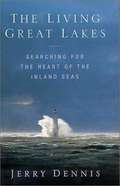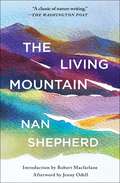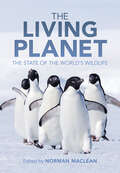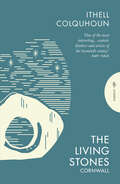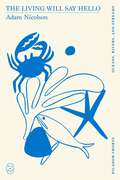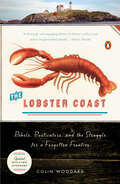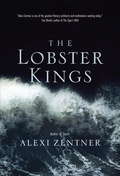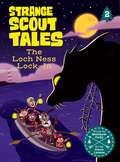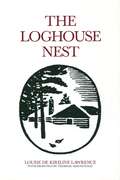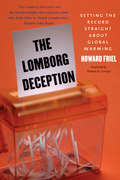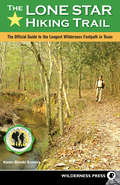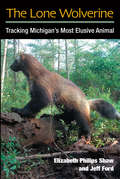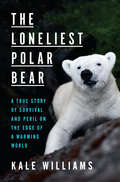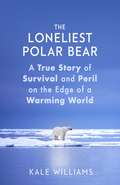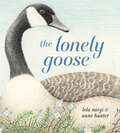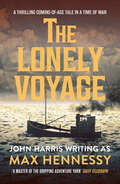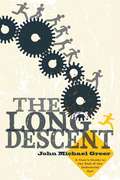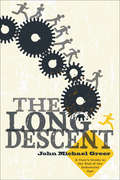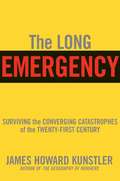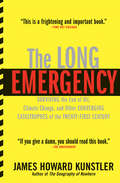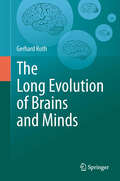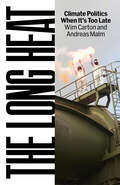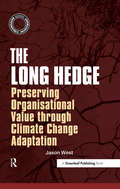- Table View
- List View
The Living Great Lakes: Searching for the Heart of the Inland Seas
by Jerry DennisIn an effort to deepen his understanding of the Great Lakes, the author sails on a yacht from the upper reaches of Lake Michigan, through the lakes and the Erie Canal, down the Hudson and up the Atlantic coast to Maine. Along the way he encounters life-threatening squalls, meets a gallery of colorful characters, and reflects upon the past and future of the inland seas. In a series of asides he describes shipwrecks, historic battles, and ecological challenges.
The Living Mountain
by Nan ShepherdAn internationally bestselling classic on the power of the natural world—&“part memoir, part field notebook, part lyrical meditation on nature and our relationship with it, evocative of Rachel Carson and Henry Beston and John Muir&” (Maria Popova, The New York Times).Now with a new introduction by Robert Macfarlane and a new afterword by Jenny Odell, this masterpiece of nature writing by Nan Shepherd describes her journeys into &“the high and holy places&” of the Cairngorm Mountains of Scotland. There she encounters a world of spectacular cliffs, deep silences, and lakes so clear that they cannot be imagined. As she walks through clouds, endures blizzards, and watches the great spirals of eagles in flight, Shepherd comes to know something about the hidden life of this remarkable landscape—and also herself. The Living Mountain is the result of one woman&’s lifetime spent in search of the essential nature of the wild world around her. Composed during World War II, Shepherd&’s manuscript lay untouched for almost four decades, nearly lost to time, before it was finally published. In the decades since, audiences and critics of all generations have embraced it as a classic, an enduring testament to the magnificence of mountains and our communion with the environment.
The Living Planet: The State of the World's Wildlife
by Norman MacleanSince 1970, there has been an overall decline in wildlife populations in the order of 52%. Freshwater species populations have declined by 76%; species populations in Central and South America have declined by 83%; and in the Indo-Pacific by 67%. These are often not complete extinctions, but large declines in the numbers of animals in each species, as well as habitat loss. This presents us with a tremendous opportunity, before it is too late to rescue many species. This book documents the present state of wildlife on a global scale, using a taxonomic approach, and serving as a one stop place for people involved in conservation to be able to find out what is in decline, and the success stories that have occurred to bring back species from the brink of extinction - primarily due to conservation management techniques - as models for what we might achieve in the future.
The Living Stones: Cornwall (Pushkin Press Classics)
by Ithell ColquhounA classic travelogue by Britain's foremost female surrealist painter, which immerses the reader in a dreamlike Cornwall where landscape and legend meet&“Her responses to the aura of place are keen, and her eye for detail is excitingly sharp&” — Sunday Times&“She is sensitive to the ways of wind and water, the flowers and birds and trees&” — Country LifeIn the midst of the 2nd World War, surrealist painter Ithell Colquhoun withdraws from London to Cornwall, searching for a studio and a refuge from the Blitz, as well as from a shattered marriage. So begins a profound and lifelong relationship with Britain's westernmost county. It is a land of granite ridges and lush valleys, surrounded by sea and steeped in myth, where the ancient Celtic past makes contact with the present. There she finds a hut with no running water or electricity, and lovingly brings it to life, creating a haven for her creative pursuits, and slowly coming to think of these rivers, hills and caves, seen in every season, as her true home.Drawn to the sacred and the beautiful, the wild and the weird, Colquhoun writes about Cornwall as a living landscape, where every tree, standing stone and holy well is a palimpsest of folklore - and perhaps a place where everyday reality connects to the world beyond. In prose as gorgeously dreamlike as it is sharply witty, this inimitable artist gives us a travelogue deeply attuned to natural rhythms, local atmosphere and the eerie beauty of a place that is as much legend as it is water and rock.
The Living Will Say Hello (Picador Shorts)
by Adam NicolsonAn intimate, quirky, and soulful portrait of the many lives that swirl and teem in that microcosm of the universe, the ocean rock pool.In this standalone extract from Adam Nicolson’s Life Between the Tides, the reader gets a close-up view of some of the ocean’s most intriguing characters.The sea is not made of water. Creatures are its genes. Look down as you crouch over the shallows and you will find a periwinkle or a prawn, a claw-displaying crab or a cluster of anemones ready to meet you. No need for binoculars or special stalking skills: go to the rocks and the living will say hello.In this distilled version of the powerful, revelatory Life Between the Tides, Adam Nicolson takes the reader on a wonder-filled tour of some of the animal residents of the rock pools that are the stage for so much of the life and poetry of the ocean.We visit with the sandhopper, prawn, winkle, crab, and anemone, and each episode reenacts the book’s idea of the inner drama of life in this cloistered and vibrant space.Nicolson writes “with scientific rigor and a poet’s sense of wonder” (The American Scholar). He animates the world of the rock pool and provides an essential perspective on a marine world as intricate and infinite as our own and not much further off than the tips of our noses.The Living Will Say Hello is part of the Picador Shorts series “Oceans, Rivers, and Streams,” in which excerpts from beloved classics speak to our relationship with our water bodies, great and small.
The Lizard Scientists: Studying Evolution in Action (Scientists in the Field)
by Dorothy Hinshaw PatentIn this groundbreaking, exceptionally researched installment of the award-winning Scientists in the Field series, discover how lizards rapidly adapt to life in the Caribbean islands, allowing scientists to study Charles Darwin’s theory of evolution by natural selection in real time. Award-winning author Dorothy Hinshaw Patent joins forces with scientists/filmmakers Neil Losin and Nate Dappen, whose work is detailed in the Smithsonian Channel documentary “Laws of the Lizard,” to explore how the small but mighty lizards we call “anoles” are used by scientists to study basic principles of evolution and ecology. Travel with the team to Florida and the Caribbean as they research how anoles followed similar but independent evolutionary paths on the four major islands of the Greater Antilles (Puerto Rico, Hispaniola, Jamaica, and Cuba). So while anoles on different islands may look like close relatives, they often are not! This is Darwin's principle of natural selection at work.And it makes anoles the perfect subjects for experiments that study how animals adapt to new challenges—such as climate change—in this exciting and timely addition to a celebrated series.
The Lobster Coast: Rebels, Rusticators, and the Struggle for a Forgotten Frontier
by Colin Woodard&“A thorough and engaging history of Maine&’s rocky coast and its tough-minded people.&”—Boston Herald&“[A] well-researched and well-written cultural and ecological history of stubborn perseverance.&”—USA TodayFor more than four hundred years the people of coastal Maine have clung to their rocky, wind-swept lands, resisting outsiders&’ attempts to control them while harvesting the astonishing bounty of the Gulf of Maine. Today&’s independent, self-sufficient lobstermen belong to the communities imbued with a European sense of ties between land and people, but threatened by the forces of homogenization spreading up the eastern seaboard.In the tradition of William Warner&’s Beautiful Swimmers, veteran journalist Colin Woodard (author of American Character: A History of the Epic Struggle Between Individual Liberty and the Common Good) traces the history of the rugged fishing communities that dot the coast of Maine and the prized crustacean that has long provided their livelihood. Through forgotten wars and rebellions, and with a deep tradition of resistance to interference by people &“from away,&” Maine&’s lobstermen have defended an earlier vision of America while defying the &“tragedy of the commons&”—the notion that people always overexploit their shared property. Instead, these icons of American individualism represent a rare example of true communal values and collaboration through grit, courage, and hard-won wisdom.
The Lobster Kings
by Alexi ZentnerThere is no sophomore slump here: Zentner has delivered a follow-up that is just as literary as Touch, but even more commercial, with more action, and more romance. The Lobster Kings takes place on fictional Loosewood Island, somewhere off Maine and the Maritimes, and a ruggedly pastoral outpost claimed by both the United States and Canada. For generations it has been unofficially ruled by a family called the Kings, since the legendary Brumfitt Kings came over from Ireland with the bountiful lobsters "making a road with their backs." But modern times bring modern problems, and the waters off Loosewood Island are starting to be poached by James Harbor, a rival community. With the health of current patriarch Woody Kings fading, it's up to his daughter Cordelia to pick up the mantle. Her name is no casual reference to King Lear: Zentner has crafted a truly Shakespearean plot filled with sibling rivalry, love lost and won, art history, and the sometimes deadly adventure that is lobster fishing off the windswept Atlantic coast.From the Trade Paperback edition.
The Loch Ness Lock-In: Strange Scout Tales #2 (Strange Scout Tales #2)
by Matthew Cody Steve LambeThe ragtag scout troop returns in a new adventure—this time, to solve a mystery surrounding the famed Loch Ness Monster. Some scouts spend their weekends weaving baskets, but if you’re a Strange Scout you spend them tagging Massachusetts Pukwudgies (harder than it sounds—Pukwudgies like to set things on fire). Troop Danger has come a long way from their Troop Dweeb days, but nothing can prepare them for what’s next: The Strange Scouts Annual Loch Ness Lock-In! Once a year, Strange Scout troops from around the world are invited to test their scouting skills in an old lighthouse on the shore of the infamous Loch Ness. But when the area surrounding Loch Ness suffers unusual damage, evidence points to a dastardly plot to frame Nessie herself! Can the Strange Scouts’ newest troop clear Nessie’s name and earn their badges before it’s too late?
The Loghouse Nest
by Louise De LawrenceA charming account of the author’s special relationship with the birds and wild creatures who shared her northern homesite at Pimisi Bay, near Mattawa, Ontario. The Loghouse Nest is another Natural Heritage classic by Canada’s internationally acclaimed nature writer, Louise de Kiriline Lawrence. Delightfully illustrated throughout by no less than Thoreau MacDonald, with endpaper drawings by the author.
The Logic of Sufficiency
by Thomas PrincenWinner of the 2007 Sprout Award given by the International Studies Association. What if modern society put a priority on the material security of its citizens and the ecological integrity of its resource base? What if it took ecological constraint as a given, not a hindrance but a source of long-term economic security? How would it organize itself, structure its industry, shape its consumption? Across time and across cultures, people actually have adapted to ecological constraint. They have changed behavior; they have built institutions. And they have developed norms and principles for their time. Today's environmental challenges--at once global, technological, and commercial--require new behaviors, new institutions, and new principles. In this highly original work, Thomas Princen builds one such principle: sufficiency. Sufficiency is not about denial, not about sacrifice or doing without. Rather, when resource depletion and overconsumption are real, sufficiency is about doing well. It is about good work and good governance; it is about goods that are good only to a point. With examples ranging from timbering and fishing to automobility and meat production, Princen shows that sufficiency is perfectly sensible and yet absolutely contrary to modern society's dominant principle, efficiency. He argues that seeking enough when more is possible is both intuitive and rational--personally, organizationally and ecologically rational. And under global ecological constraint, it is ethical. Over the long term, an economy--indeed a society--cannot operate as if there's never enough and never too much.
The Lomborg Deception: Setting the Record Straight About Global Warming
by Thomas E. LovejoyIn this major assessment of leading climate-change skeptic Bjørn Lomborg, Howard Friel meticulously deconstructs the Danish statistician's claim that global warming is "no catastrophe" by exposing the systematic misrepresentations and partial accounting that are at the core of climate skepticism. His detailed analysis serves not only as a guide to reading the global warming skeptics, but also as a model for assessing the state of climate science. With attention to the complexities of climate-related phenomena across a range of areas--from Arctic sea ice to the Antarctic ice sheet--The Lomborg Deceptionalso offers readers an enlightening review of some of today's most urgent climate concerns. Friel's book is the first to respond directly to Lomborg's controversial research as published inThe Skeptical Environmentalist(2001) andCool It: The Skeptical Environmentalist's Guide to Global Warming(2007). His close reading of Lomborg's textual claims and supporting footnotes reveals a lengthy list of findings that will rock climate skeptics and their allies in the government and news media, demonstrating that the published peer-reviewed climate science, as assessed mainly by the U. N. 's Intergovernmental Panel on Climate Change, has had it mostly right--even if somewhat conservatively right--all along. Friel's able defense of Al Gore'sAn Inconvenient Truthagainst Lomborg's repeated attacks is by itself worth an attentive reading.
The Lone Star Hiking Trail
by Karen SomersOne of the hidden jewels of Texas, the Lone Star Hiking Trail is the only long-distance National Recreation Trail in the state. At 128 miles (including loop trails), it is also the state's longest continuously marked and maintained footpath. Located in the famed Big Thicket area in east Texas, the trail is well-suited for both short and long hikes (of up to 10 days), appealing to dayhikers, overnight backpackers and long-distance hikers. The LSHT lies between the major metro centers of Houston-Galveston, Dallas-Fort Worth, Austin, and San Antonio--home to more than 8 million people just a 2-hour drive from the trail. The author, a Texas native, is an experienced long-distance hiker who has thru-hiked the Appalachian Trail, the Pacific Crest Trail, and many other nationally recognized long-distance trails throughout the U.S. This is the first guidebook to the trail and is officially endorsed and promoted by the Lone Star Hiking Trail Club.
The Lone Wolverine: Tracking Michigan's Most Elusive Animal
by Elizabeth Philips Shaw Jeff FordIt began in late winter of 2004. Almost 100 years had passed since the last spotting of a wild wolverine in Michigan when coyote hunters caught a glimpse of one of the animals in a frozen farm field in the northern thumb region. For the next six years, Jeff Ford, a local science teacher and amateur naturalist, devoted himself to locating and filming the wolverine that had unexpectedly and inexplicably appeared in the Wolverine State. By the time hikers found the animal dead in early 2010, Ford had taken hundreds of rare live action photos and shot numerous hours of video, with the story of the "Wolverine Guy" attracting national attention through countless newspaper and magazine articles and appearances on Animal Planet and PBS Nature. This is the tale of Ford's quest as he uncovered answers to mysteries surrounding the animal's territory and movement patterns, while sparking a flurry of controversy surrounding the elusive predator's origin, much of which remains unresolved today. It's an intimate look at research in the raw, from DNA samples stuck on barbed wire to a sophisticated, motion-sensing infrared camera unit strategically placed to observe nocturnal behavior. The Lone Wolverine brings to vivid life this unforgettable piece of American wildlife lore, using candid interviews, public records, and Ford's own vast storehouse of notes, personal writings, correspondence, and images, offering an extraordinary chronicle of a wild wolverine in its natural habitat, at play and in fierce competition for food and survival. This is a wildlife detective story, recounting years of study and fierce debate as researchers pondered the riddles of Michigan's last wolverine---her origins, habits, and ultimately the cause of her untimely death.
The Loneliest Polar Bear: A True Story of Survival and Peril on the Edge of a Warming World
by Kale Williams&“A moving story of abandonment, love, and survival against the odds.&”—Dr. Jane Goodall The heartbreaking and ultimately hopeful story of an abandoned polar bear cub named Nora and the humans working tirelessly to save her and her species, whose uncertain future in the accelerating climate crisis is closely tied to our ownSix days after giving birth, a polar bear named Aurora got up and walked away from her den at the Columbus Zoo, leaving her tiny squealing cub to fend for herself. Hours later, Aurora still hadn&’t returned. The cub was furless and blind, and with her temperature dropping dangerously, the zookeepers entrusted with her care felt they had no choice: They would have to raise one of the most dangerous predators in the world by hand. Over the next few weeks, a group of veterinarians and zookeepers worked around the clock to save the cub, whom they called Nora.Humans rarely get as close to a polar bear as Nora&’s keepers got to their fuzzy charge. But the two species have long been intertwined. Three decades before Nora&’s birth, her father, Nanuq, was orphaned when an Inupiat hunter killed his mother, leaving Nanuq to be sent to a zoo. That hunter, Gene Agnaboogok, now faces some of the same threats as the wild bears near his Alaskan village of Wales, on the westernmost tip of the North American continent. As sea ice diminishes and temperatures creep up year after year, Agnaboogok and the polar bears—and everyone and everything else living in the far north—are being forced to adapt. Not all of them will succeed. Sweeping and tender, The Loneliest Polar Bear explores the fraught relationship humans have with the natural world, the exploitative and sinister causes of the environmental mess we find ourselves in, and how the fate of polar bears is not theirs alone.
The Loneliest Polar Bear: A True Story of Survival and Peril on the Edge of a Warming World
by Kale WilliamsThe heartbreaking and ultimately hopeful story of an abandoned polar bear cub named Nora and the humans working tirelessly to save her and her species, whose uncertain future in the accelerating climate crisis is closely tied to our own. Six days after giving birth, a polar bear named Aurora got up and left her den at the Columbus Zoo, leaving her tiny, squealing cub to fend for herself. Hours later, Aurora still hadn't returned. The cub was furless and blind, and with her temperature dropping dangerously, the zookeepers entrusted with her care felt they had no choice: They would have to raise one of the most dangerous predators in the world themselves, by hand. Over the next few weeks, a group of veterinarians and zookeepers would work around the clock to save the cub, whom they called Nora.Humans rarely get as close to a polar bear as Nora's keepers got with their fuzzy charge. But the two species have long been intertwined. Three decades before Nora's birth, her father, Nanuq, was orphaned when an Inupiat hunter killed his mother, leaving Nanuq to be sent to a zoo. That hunter, Gene Agnaboogok, now faces some of the same threats as the wild bears near his Alaskan village of Wales, on the westernmost tip of the North American continent. As sea ice diminishes and temperatures creep up year-after-year, Gene and the polar bears--and everyone and everything else living in the far north--are being forced to adapt. Not all of them will succeed.Sweeping and tender, The Loneliest Polar Bear explores the fraught relationship humans have with the natural world, the exploitative and sinister causes of the environmental mess we find ourselves in, and how the fate of polar bears is not theirs alone.
The Lonely Goose
by Lela NargiIn this lyrical and poignant nonfiction book about loss, follow the lives of a pair of Canada geese as they perform their courtship rituals, raise nests full of chicks, and migrate with the seasons... until one goose has to brave the world alone.Here is how he won her over:He was the best dancer with the most powerful moves.He hissed loudly and bravely.He had a long, sleek neck and a fine bill.This is a stunningly illustrated, moving picture book about two geese bonded for life. They have six eggs, and then six chicks, and they teach them how to fly. But when one of the geese in the partnership becomes ill and dies, what happens to its partner goose? She is forced, suddenly, to brave the world on her own—until a new partner goose comes along, calling to her with his own powerful moves. With scientific facts, a beautiful text, and gorgeous art work, young readers will find themselves inspired to take a closer look at the natural world around them.
The Lonely Voyage: A thrilling coming of age tale in a time of war (By Air, By Land, By Sea Collection)
by Max HennessyThe gripping tale of one boy’s journey into manhood… and towards war.Jess Ferigo, a young man with few prospects other than growing old in the same town he has always known, dreams of a life at sea, much to the ire of his family.Making the tough decision to leave his old life behind, he takes up a position in charge of poaching on a battered trawler, accompanied by Pat Fee and Old Boxer, a wreck of an educated man who redeems Jess.As he leaves his boyhood behind, bitter years are followed by the Second World War where Old Boxer and Jess make a poignant rescue on the sand dunes of Dunkirk. After years of searching, finally Jess Ferigo's lonely voyage is over.The Lonely Voyage is John Harris' first novel – a graphic, moving tale of the sea from an author who understands a sailor’s life in wartime like few others, perfect for fans of Alexander Fullerton, David McDine and Alistair MacLean.
The Long Descent: A User's Guide to the End of the Industrial Age
by John Michael GreerAmericans are expressing deep concern about US dependence on petroleum, rising energy prices, and the threat of climate change. Unlike the energy crisis of the 1970s, however, there is a lurking fear that now the times are different and the crisis may not easily be resolved. The Long Descent examines the basis of such fear through three core themes: Industrial society is following the same well-worn path that has led other civilizations into decline, a path involving a much slower and more complex transformation than the sudden catastrophes imagined by so many social critics today. The roots of the crisis lie in the cultural stories that shape the way we understand the world. Since problems cannot be solved with the same thinking that created them, these ways of thinking need to be replaced with others better suited to the needs of our time. It is too late for massive programs for top-down change; the change must come from individuals. Hope exists in actions that range from taking up a handicraft or adopting an "obsolete" technology, through planting an organic vegetable garden, taking charge of your own health care or spirituality, and building community. Focusing eloquently on constructive adaptation to massive change, this book will have wide appeal. John Michael Greer is a certified Master Conserver, organic gardener, and scholar of ecological history. The current Grand Archdruid of the Ancient Order of Druids in America (AODA), his widely-cited blog, The Archdruid Report (thearchdruidreport.blogspot.com) deals with peak oil, among other issues. He lives in Ashland, Oregon.
The Long Descent: A User's Guide to the End of the Industrial Age
by John Michael GreerThe author of Dark Age America shares a harrowing vision of the future and what you can do to take action and make change.Americans are expressing deep concern about US dependence on petroleum, rising energy prices and the threat of climate change. Unlike the energy crisis of the 1970s, however, there is a lurking fear that, now, the times are different, and the crisis may not easily be resolved.The Long Descent examines the basis of such fear through three core themes:Industrial society is following the same well-worn path that has led other civilizations into decline, a path involving a much slower and more complex transformation than the sudden catastrophes imagined by so many social critics today.The roots of the crisis lie in the cultural stories that shape the way we understand the world. Since problems cannot be solved with the same thinking that created them, these ways of thinking need to be replaced with others better suited to the needs of our time.It is too late for massive programs for top-down change; the change must come from individuals.Hope exists in actions that range from taking up a handicraft or adopting an “obsolete” technology, through planting an organic vegetable garden, taking charge of your own health care or spirituality, and building community.Focusing eloquently on constructive adaptation to massive change, this book will have wide appeal.Praise for The Long Descent“At once erudite and entertaining, Greer’s exploration of the dynamics of societal collapse couldn’t be more timely.” —Richard Heinberg, Senior Fellow, Post Carbon Institute, and author of The Party’s Over and Peak Everything“Candidates for public office, and the voters who elect them, should be required to read [Greer’s] accurate diagnosis of the terminal illness our fossil-energy subsidized industrial civilization has too long denied. He shows how stubborn belief in perpetual progress blinded us to the abyss toward which we were speeding and thus impeded wise preparation for our unavoidable descent into a deindustrial age. We must hope that the array of mitigating tools he prescribes may yet render that descent down the back side of Hubbert’s peak less devastating than it will be if we insistently claim a right to be prodigal in using this finite Earth.” —Willam R. Catton, Jr., author of Overshoot: The Ecological Basis of Revolutionary Change
The Long Emergency
by James Howard KunstlerKunstler discusses the implications of peak oil, where oil production will eventually start to decrease as most of the easily-accessible oil has been used already. He gives some historical background and then discusses various proposed alternatives to oil and natural gas for providing transportation and electricity. He is skeptical that anything will be able to replace the abundant supply of energy that has been supplied by oil, with the possible exception of nuclear energy for electricity, and believes that the age of globalization will come to an end with declining standards of living. He discusses what he sees as the implications for different parts of the country and the world, each having their unique situations.
The Long Emergency: Surviving the End of Oil, Climate Change, and Other Converging Catastrophes of the Twenty-First Century
by James Howard KunstlerA controversial hit that sparked debate among businessmen, environmentalists, and bloggers, The Long Emergency by James Howard Kunstler is an eye-opening look at the unprecedented challenges we face in the years ahead, as oil runs out and the global systems built on it are forced to change radically.
The Long Evolution of Brains and Minds
by Gerhard RothThe main topic of the book is a reconstruction of the evolution of nervous systems and brains as well as of mental-cognitive abilities, in short "intelligence" from simplest organisms to humans. It investigates to which extent the two are correlated. One central topic is the alleged uniqueness of the human brain and human intelligence and mind. It is discussed which neural features make certain animals and humans intelligent and creative: Is it absolute or relative brain size or the size of "intelligence centers" inside the brains, the number of nerve cells inside the brain in total or in such "intelligence centers" decisive for the degree of intelligence, of mind and eventually consciousness? And which are the driving forces behind these processes? Finally, it is asked what all this means for the classical problem of mind-brain relationship and for a naturalistic theory of mind.
The Long Heat: Climate Politics When It’s Too Late
by Andreas Malm Wim CartonA scathing critique of proposals to geoengineer our way out of climate disaster, by the bestselling authors of OvershootThe world is crossing the 1.5°C global warming limit, perhaps exceeding 2°C soon after. What is to be done when these boundaries, set by the Paris Agreement, have been passed? In the overshoot era, schemes proliferate for muscular adaptation or for new technologies to turn the heat down at a later date by removing CO2 from the air or blocking sunlight. Such technologies are by no means safe; they come with immense risks and provide an excuse for those who would prefer to avoid limiting emissions in the present. But do they also hold out some potential? Can the catastrophe be reversed, masked or simply adapted to once it is a fact? Or will any such roundabout measures simply make things worse?The Long Heat maps the new front lines in the struggle for a liveable planet and insists on the climate revolution long overdue. In the end, no technology can absolve us of responsibility for our planet and each other.
The Long Hedge: Preserving Organisational Value through Climate Change Adaptation (The Responsible Investment Series)
by Jason WestPart of the Greenleaf Publishing Responsible Investment Series.Mitigating and adapting to risks and changing circumstances is a natural part of doing business. But methods of mitigating and adapting can be quite different in terms of time, cost and observed impacts. The impacts of mitigation activities are more immediate while the benefits of adaptation activities may take many years to take effect. Nowhere is this difference more apparent than in the case of the corporate response to climate change.In the context of climate change, adaptation is the process of changing behaviour in response to actual or expected climate change impacts. Climate change adaptation is now emerging as a critical partner to mitigation, and indeed may even become the primary protection mechanism for future generations.In this unique book, Jason West provides a comprehensive assessment of the management of climate change adaptation in the corporate sector. The book provides a formal overview of the range of approaches available along with a series of practical case studies and examples that can be used by companies and other organizations to identify, assess and manage climate change adaptation.A major focus is on the financial and investment implications of climate change adaptation. West examines how firms can evaluate the investment decisions associated with long-term climate change adaptation measures, including how such investments can be valued and funded, the appropriate accounting treatment of such measures and appropriate risk management and governance practices in relation to such measures. The book also considers the needs and interests of investors and other stakeholders, and considers how they can assess the adequacy and appropriateness of corporate action on climate change.The Long Hedge will be essential reading and a key text for risk-practitioners, investors, financiers, scholars and policy makers in the field of climate change.
